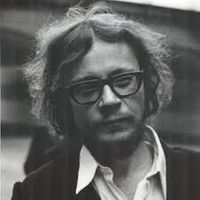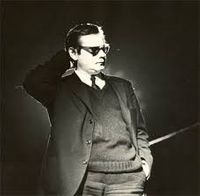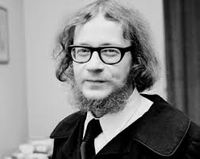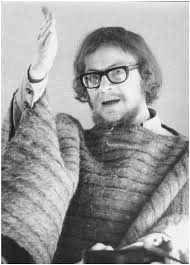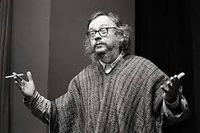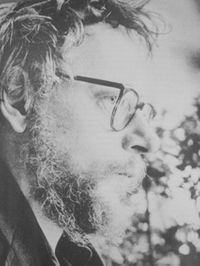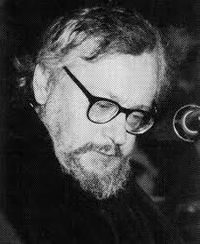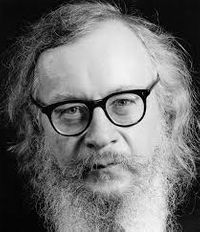Jerzy Grotowski
Theater director and theoretician, educator, creator of acting methods.
Grotowski was born in 1933 in the city of Rzeszow in southeastern Poland and died in 1999 in Pontedera, Italy.
He is considered to have been one of the greatest reformers of 20th century theatre.
In 1955 Grotowski graduated from the State Higher School of Theatre in Krakow with a degree in acting. He went on to study directing at the Lunacharsky Institute of Theatre Arts in Moscow 1955-1956. It was there that he learned about the acting techniques and artistic approaches of such greats of the Russian theatre as Stanislavsky, Vakhtangov, Meyerhold and Tairov.
Upon returning to Poland, he assumed an assistant professorship at the theatre school in Krakow and began studying stage direction (1956-1960). He debuted as a director in 1957 at the Stary Teatr in Krakow.
Grotowski also created radio plays for Polish Radio Theatre. These were based primarily on Chinese and Tibetan legends. Around this time he also prepared and led a series of lectures on Asian philosophy at the student club.
In 1959 he made a permanent move to Opole, where he took over the artistic directorship of the Thirteen Row Theatre. The institution also gained a new literary director in the person of Ludwik Flaszen
Theatreproductions 1959 - 1964:
Jean Cocteau's ORPHEUS , Byron's CAIN,
MYSTERY-BUFFO after Vladimir Mayakovsky, and SAKUNTALA after Kalidasa, Adam Mickiewicz's FOREFATHER'S EVE, Juliusz Slowacki's KORDIAN , AKROPOLIS, based on a text by Stanislaw Wyspianski,
THE TRAGIC FATE OF DOCTOR FAUST, based on the text by Christopher Marlowe and A STUDY OF HAMLET, after William Shakespeare and Stanislaw Wyspianski .
Following the closing of the theatre in Opole in 1965, Jerzy Grotowski and his ensemble moved to Wroclaw. The first premiere of the 13 Row Laboratory Theatre at its new home was a fourth variation on AKROPOLIS after Stanislaw Wyspianski
Still in 1965, the Wroclaw theatre, which Grotowski also referred to as the Instytut Badania Metody Aktorskiej (Institute for the Study of Acting Methods), premiered two variations on Slowacki's adaptation of Calderon's THE CONSTANT PRINCE .
APOCALYPSIS CUM FIGURIS , which alongside with AKROPOLIS and THE CONSTANT PRINCE, became the most famous of Grotowski's productions throughout the world. All of these were produced at the theatre in Wroclaw, which acquired a new name in 1971 - the Actors' Institute - Laboratory Theatre.
In the 1960s and 1970s the Laboratory Theatre went with this productions on a series of grand foreign tours and participated in a majority of the world's significant theatre festivals.
In 1965 the book "Towards a Poor Theatre" was first published in Denmark and appeared 1968 in the United States with a preface by Peter Brook. It summed up the director's first creative period, during which he focused on shaping acting methods and formulating the idea of "poor theatre."
In the 1970s Jerzy Grotowski slowly began to abandon theatre and ceased mounting theatrical productions entirely. He deepened his studies into Central Asian culture and schools of spirituality. Grotowski began to focus on interpersonal relationships in a new dimension, specifically, that of "celebration." His new "live culture" was designed to lead to face-to-face meetings between human beings.Intensive quasi-theatrical workshops were also held in 1975, during the University for the Exploration of a Theatre of Nations that was organized by Grotowski and the Laboratory Theatre.
At that time, the top people representing exploratory theatre throughout the world traveled to Wroclaw, many of them inspired by the thought of Grotowski. Participants included Peter Brook, Jean-Louis Barrault, Joseph Chaikin, Eugenio Barba, Luca Ronconi and Andre Gregory.
In 1976 Jerzy Grotowski presented a new research program that he referred to as THEATRE OF SOURCES. He pursued this program in the region surrounding the north-eastern city of Bialystok, as well as during voyages to Mexico, Nigeria, India and Haiti. Ethnological and anthropological in nature, Grotowski pursued these explorations with his international group of collaborators. This research consisted of looking at rituals from various parts of the globe and attempting to find the common denominator between them, exploring at the same time their theatrical forms. During their work in the field, participants were to confront their techniques with the old, existing techniques of individual tribes. Grotowski stated, however, that his project could "not be viewed as a zeroing in on the exotic, as some folkloric celebration or as a festival of cultures of the so-called Third World" Rather, the techniques applied were designed to reaffirm a feeling of connection with the natural world.
In 1982, after the declaration of Martial Law in Poland, Grotowski emigrated to the United States. Initially, he was a professor at Columbia University in New York.
In 1983 he was appointed a professor at the University of California, where he realized his next project, known as OBJECTIVE DRAMA.
In 1984 the ensemble of the Laboratory Theatre voted to close the troupe's center in Wroclaw. In 1985 Grotowski relocated to Pontedera in Italy. While there he worked at a center that bore his own name (The Work Centre of Jerzy Grotowski - Centro di Lavoro di Jerzy Grotowski) with a group of international interns, focusing on a program titled "Ritual Plays." At this time he worked most closely with Thomas Richards, who also assembled documentation of Grotowski's research at this time and focused on publishing Grotowski's works. "At Work with Grotowski on Physical Actions" was one of the more significant titles published as a result of his efforts. Jerzy Grotowski spent the last years of his creative life on laboratory work. His students studied in isolation and the results of their work were initially shown to only a handful of people, and only later made available to a broader public.
Significant awards and distinctions:
1971 - Appointed Full Professor of the Ecole Supérieure d'Art Dramatique in Marseille
1972 - State Award 1st class in the realm of art for "creative activities with the Laboratory Theatre on staging and research into the art of acting"; Diploma of Merit from the National Museum of the USA "for exceptional contributions to the development of world theatre";
1973 - Creation of the American Institution for Research and Studies into the Oeuvre of Jerzy Grotowski, whose primary objective was to "popularize Grotowski's artistic discoveries and ideas in the USA"; Honorary Doctorate of the University of Pittsburgh;
1975 - Winner of a Wroclaw City Prize for "his creative activities in the realm of theatre"
1985 - Honorary Doctorate of the University of Chicago
1991 - Honorary Doctorate of the University of Wroclaw
1997 - Professor of the College de France.
2020©Las Téoulères
